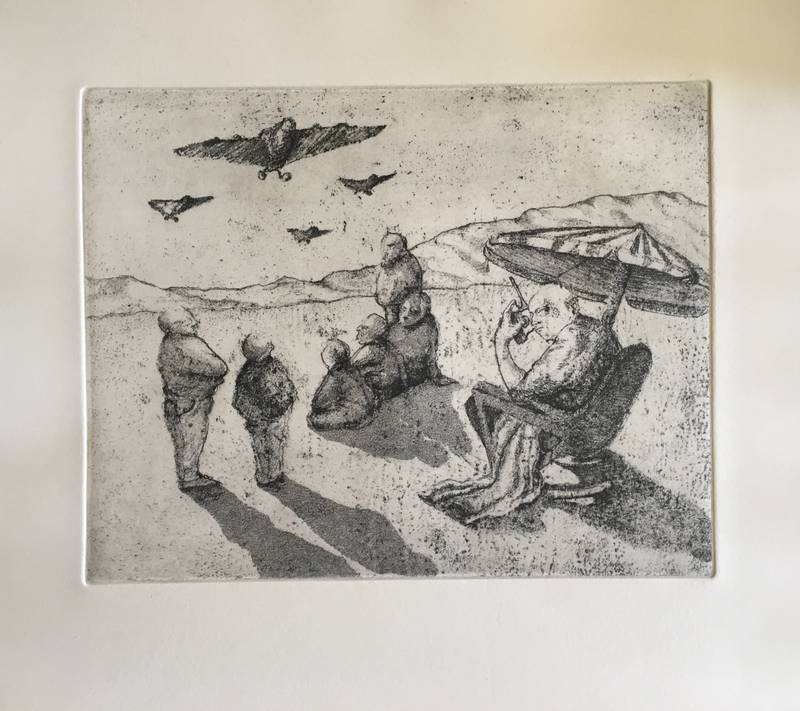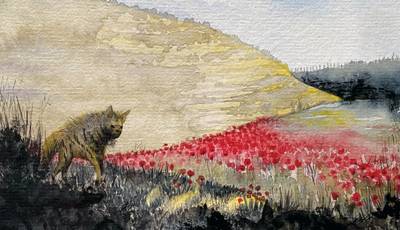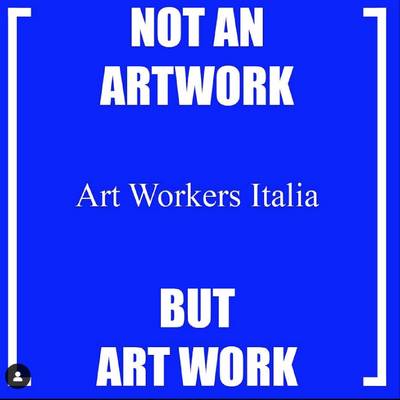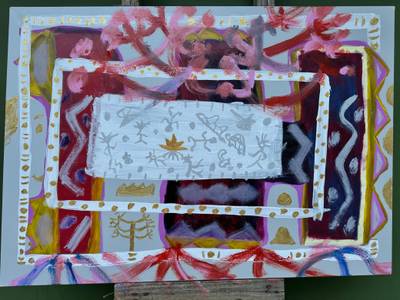

Mina Jafari, 2020, calchography print
Dr. Hanna Järvinen currently works as a university lecturer at the doctoral programme of the Theatre Academy of the University of the Arts Helsinki, Finland. She is also Honorary Visiting Research Fellow at the Centre for Interdisciplinary Research in Dance at De Montfort University, Leicester, and holds the title of Docent in Dance History at the University of Turku.
A Promise to Self in the New Year, 2021
After teetering on the edge of burnout since the beginning of November, I decided that instead of my usual ‘holiday-spent-doing-research’ thing, I would have a deliberate vacation, lasting in excess of seven consecutive days, at the end of 2020. It was basically doing that or ending up on sick leave unable to function.
I had taken two consecutive days off twice since March (even though I had officially a month of sick leave after a failed attempt at impersonating a graceful gazelle with a teacup as well as the weeks of official leave included in my work contract – but I had a workshop to run and an excellent MA thesis to supervise and articles to finish during that sick leave, and… well, see what I’m like?) I had been in hyper-production mode all year, with much to show, but now I was crashing. After the holiday experiment, I reflected upon what were its effects on Facebook 4 January 2021, largely as a note to self, as this time of year is usually filled with a rush of deadlines.
TL;DR — schedule a time to be bored.
#1
Guess what: having a vacation is important, schedule it and prioritise it so that it happens.
My former flatmate and dear friend, who is also an academic like me, once told me that it is important to mark vacation time as ‘busy’ in your calendar a year in advance so as to refuse all tasks for that time. Sage advice.
The fact that international academia runs on a US/UK schedule that explicitly requires those of us from the margins to sacrifice holidays for work if we seek to participate at all, has meant that finding the time to have a week off (let alone the month off that I have on paper) is increasingly difficult. The prime conference season in the international arena is ‘before the summer holidays’, i.e. late June and especially July. In Finland, this is the prime holiday season. Thus, for years, the academic society I was most strongly affiliated with, and where I later served as a Treasurer (2013–2017), had their annual conference and board meeting at midsummer. This meant that when all of my friends and relatives were having the equivalent of Christmas and New Year rolled into one, I was at work.
As conferences are important for networking, socialising, and learning about the latest ideas, ‘having a holiday’ (especially during the month of July allotted to it by the employer) would mean not doing the very thing that is important and meaningful in the work itself (and related social life). Add to this the fact that efficiency measures have increasingly meant that for most academics, holidays are the only time for serious thinking and research activities, and you can see why I haven’t had a holiday in some time: I have prioritised work.
I now realise this is stupid and that I should ensure to have my cake and eat it too.
#1b
I also made myself a rule that if an inherently positive thing becomes a chore or an obligation, it does not count as ‘vacation’ – it is a chore or an obligation that is not work, but also not something that balances out work-related stress. Days of doing chores are not vacation, and should not be counted in vacation time when marking that ‘busy’ week in the calendar the previous year. So, in addition to saying ‘no’ to work stuff for that week, also say ‘no’ to chores.)
#2
It’s okay to spend the entire night doing this even if this means you only get six hours of sleep before 1 pm. See #3.)
#3
Abolish the vacation police! ‘Vacation’ means nobody will be disappointed with you if you sleep well into the afternoon (even if this is because of #2b) or have chocolate for breakfast and lunch or generally fail to adult. It’s not a failure to not adult on vacation.
Efficiency measures have increasingly meant that for most academics, holidays are the only time for serious thinking and research activities, and you can see why I haven’t had a holiday in some time: I have prioritised work. I now realise this is stupid and that I should ensure to have my cake and eat it too.
#4
Protestant work ethic is toxic; happiness is in the now. To ensure that #1 happens, I first need to understand that vacation is only in the now. Future vacation does not exist. I’ve understood this about time for research, so why not a vacation? There’s a place for delayed gratification, but with vacation, as with research time, it’s seize the bloody day or you’ll miss it all the way.
In other words, there is absolutely no point in doing work in advance, i.e. working on a weekend to have less on your plate during the week and maybe the next weekend off (tried that, it didn’t work, got really close to burnout again); or in scheduling work requiring creative thinking for vacation time (also nope: a tired noggin won’t co-operate). That academics are, by and large, required to do both (and brag about it) is a result of a toxic work environment that causes depression and burnout, and that, in turn, is due to a) neoliberalist glorification of individualism and b) privilege masquerading as ‘work ethic’ and ‘genius’. A few days after I posted these musiangs, my former classmate from New York University shared a brilliant short piece by Anne Helen, ‘How to Work Through a Coup’, that argued one should not. “A hyper-productive person isn’t necessarily a focused person so much as a person who’s often hardened or excused themselves from the needs of their immediate and greater community. [–] The cult of productivity is a racist, sexist, able-ist, sociopathic asshole.”
#4b
To counteract the toxic productivity cult mentioned in #4, I need to divorce happiness from achievement and learn to let things slide. I did my PhD on genius, I should know that success reflects privilege and only that. So, I should not feel bad for not being a prize-winning Oxbridge scholar as a) that was so never ever in the cards when most people deciding such appointments can’t even pronounce my name let alone know dear old dad from Eton or whatnot, and I never had the privilege of a mentor fighting for me; b) the really interesting stuff comes from the margins, the really significant changes are collaborative efforts, and neither of these tends to win accolades until years later. I’ll stick with the unpopular, uncomfortable stuff, and even that can wait until after the vacation.)
#5
Vacationing requires taking the risk of being bored. No planning. No aspirations. No goals. No distractions. In a world filled with products and services marketing distraction as ‘happiness’, and in a work environment where multitasking is the norm and nothing is ever enough, vacation should be the opposite. This means refusing to keep up to date with the ipecac syrup that is called ‘news’, limiting contact with humans or the avatars posing as such on social media, and only concentrating on getting absolutely nothing useful done.
This year, I did not even get a set of samples from books of fiction I might enjoy in advance, as I realised this creates an expectation at the back of my head that I would actually read a book of fiction during this time off work. (Not to worry: I read several books during this vacation, but I did not set myself up for failing to read and I also took the risk of not having anything to read at all, and that was, surprisingly, liberating.)
So, my resolutions for 2021: be kind and generous to self and others will follow; divorce happiness from achievement; and schedule time for being bored. These should make 2021 a better year not only for me but for those around me. Productivity be screwed.







